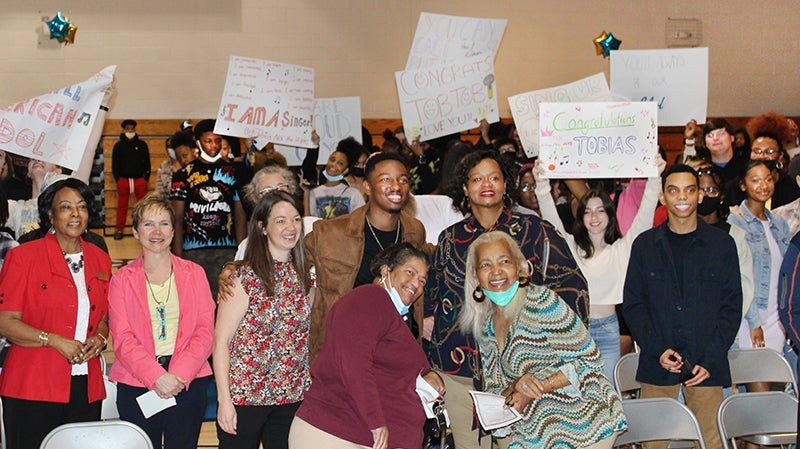Righting a wrong
Published 4:07 pm Saturday, June 14, 2014
AHOSKIE – Some have called it the American Holocaust.
For nearly 50 years more than 30 states practiced eugenics, a policy by which the state of North Carolina alone sterilized about 7,600 people that it deemed feeble-minded or otherwise “undesirable” between 1929 and 1974. Most were either forced or coerced into having the procedure.
The youngest victims were 10 years old, while percent of victims were female and 40 percent were minorities including African Americans and American Indians.
Jump ahead 40 years and now the state wants to make things right.
North Carolina has become the first state to offer financial compensation to its sterilization victims, though fewer than half are thought to be alive today.
Last year the state Legislature set aside $10 million for one-time payments to North Carolina sterilization victims. The final amount paid to each individual depends on how many come forward.
So far, state officials have verified the identities of over 200, meaning each victim could receive as much as $50,000.
But victims do not have long to come forward. Claimants must have been alive on June 30, 2013 to be eligible and any claimant, or person acting on a claimant or claimant’s estate’s behalf, must file a claim on or before June 30, 2014, and it must be received by that date. Once verified they will then have to wait until the summer of 2015 before payments are made.
While there is an Office of Justice for Sterilization Victims, administrated under the state Department of Administration, according to the UNC Center, they have not done a good job of getting the word out about compensation claims.
The Justice for Sterilization Victims Foundation was set up by then-governor Beverly Perdue in 2010 as a clearinghouse for victims, but staff has been limited because of budget cuts.
That’s where the UNCCenter for Civil Rights, based in Chapel Hill, stepped in. The Center offered to schedule free legal clinics to help victims with filing their claims.
Clinics have already been held in Charlotte, Greenville, and Raleigh. Because data provided from the biennial reports of the state Eugenics Board from 1946-to-1968 showed that 106 sterilization procedures were documented to have taken place in Hertford County, a final clinic was scheduled in Ahoskie on Thursday, with lawyers and volunteers on hand to assist claimants.
Among other area counties in the Roanoke-Chowan, according to the reports: Bertie County had 44 reported cases, Gates County had 41, and Northampton County had 37 cases.
Kadija Lewis, one of the Center’s volunteers, and an N.C. Central Law School student now serving an internship with Legal Aid, volunteered her church, New Ahoskie Baptist, for the clinic location.
“We’re not sure why certain counties had more,” said the Center’s Bethan Eynon between interviews in the church basement. “It could be people came from adjoining counties, and it might be a mental health facility in the area because a lot of people who came in through the Eugenics Board were institutionalized.
“Sometimes sterilization recommendations were made by doctors, by Social Services, and others who had some type of influence with the Eugenics Board in Raleigh,” she continued. “The Board would meet, review each file, approve or reject the sterilization, and send that information back (to the local area).
“To be eligible for the compensation your sterilization must have been done through the Eugenics Board,” Eynon added. “Sometimes, doctors, hospitals, and county-run programs made the decision on sterilization; those people would not be eligible.”
The Center has teamed up with churches for outreach because a lot of victims are reluctant to come forward. They also hope word-of-mouth spreads the news because the deadline is two weeks away.
“The more people we find, the better,” Eynon said. “But the more people we find, the less compensation money will be left. This is still very painful for a lot of people and then there are those who didn’t realize they had been sterilized until later in life when they couldn’t have kids, and a lot of people kept it secret from their families. It’s really personal, because it depends on how well they were able to deal with it emotionally.”
Submission of a claim does not automatically qualify for compensation.
“We help them with submitting a claim and what options they have if they are denied and they want to appeal,” said the Center’s Jennifer Watson Marsh. “We don’t know how many people will appeal and we haven’t discussed if we would take a case to a second appeal because that would involve litigation and not administrative review. Fortunately we have a lot of volunteer attorneys who are willing to step in and help.”
“If your records are in the Eugenics Board’s file, the higher your chance of getting paid,” said Eynon. “We don’t want to discourage people from coming forward.”
Time is running out for victims to file a claim for compensation. The Office for Justice of Sterilization Victims said Thursday that 520 people had filed claims as of June 1 and 320 of those were forwarded to the state Industrial Commission to determine eligibility.
IF YOU FEEL YOU MAY BE ELIGIBLE FOR A CLAIM: Contact the North Carolina Industrial Commission – Docket Section – 4336 Mail Service Center – Raleigh, NC 27699-4336 – Telephone: 919-807-2504 – Internet: http://www.ic.nc.gov/


